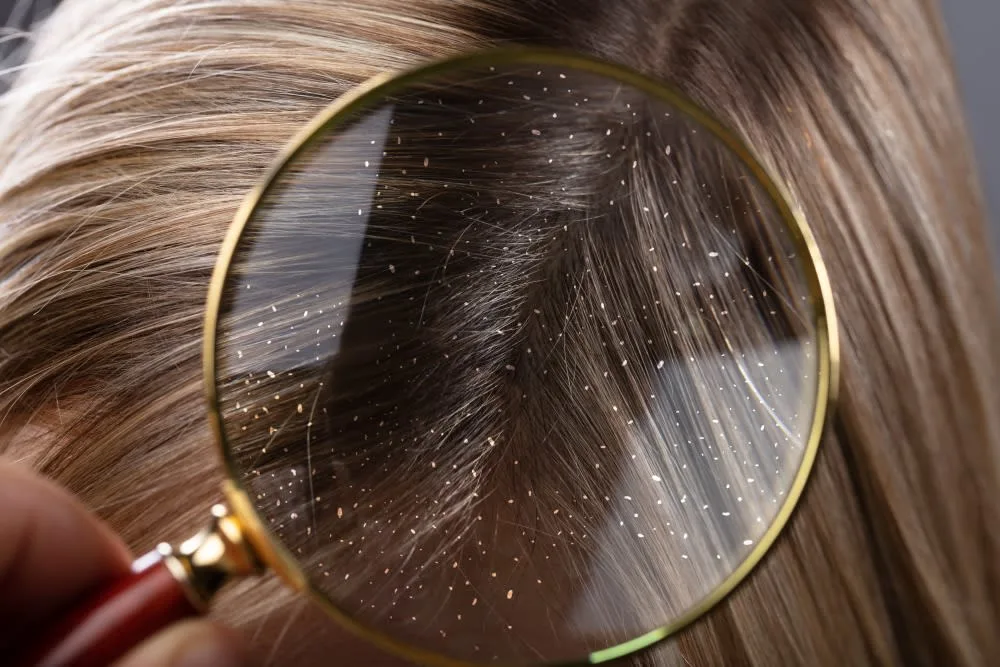FAQ - What Is Dandruff and What Are Its Symptoms?

1. What is dandruff?
2. What are the causes of dandruff?
3. What are the symptoms of dandruff?
4. How to treat dandruff?
5. When to see a doctor?
6. How to prevent dandruff?
There’s no shortcut to great hair. But even after religiously following a good hair care routine if you see flakes landing on your shoulders, that’s bad news. Dandruff brings with it an all-consuming desire to scratch your scalp. Result? Noticeable flakes that are stuck to your hair strands and shoulders.
Dandruff needs immediate attention. So, instead of sulking about dandruff adding to your discomfort, and ruining your outfits; let’s do something about it. But first, let’s address some commonly asked queries such as, “what is dandruff?”, “what are the causes of dandruff?” and “how to treat dandruff?”
What is dandruff?
Dandruff is more than just pesky white flakes that cover your shoulders, when you give your hair a subtle shake. It is a scalp condition that causes flakes of skin to appear. Plus, it also causes itchiness, the severity of which differs from one person to another. Despite the outcry, dandruff is quite common and almost everyone experiences it at some point in life, mainly between teenage and midlife.
Contrary to popular notions, dandruff has nothing to do with your hair or how many times you wash it. It’s about your scalp. And what makes dandruff bothersome is that it can get worse, when you are stressed or sick. Even weather change can trigger dandruff or worsen the existing one.
Now that you are aware of what is dandruff, let’s understand what causes these annoying, itchy flakes that can spoil your plan for the day.
What are the causes of dandruff?
The root cause is a microbe called Malassezia globosa. Sounds gross, doesn’t it? But do you know what’s more surprising? This unpleasant microbe is present on everyone’s scalp! It is responsible for breaking down the sebum or natural oil present on your scalp. The trouble begins when your scalp becomes sensitive to the by-product produced (oleic acid). It eventually irritates your scalp and triggers the onset of dandruff. The other causes include:
• Dry skin
• Sensitivity to certain hair products
• Sensitive, oily skin
• Not shampooing enough
• Certain skin conditions, like psoriasis and eczema
What are the symptoms of dandruff?
Though you might feel that dandruff came out of nowhere, certain symptoms surface before the complete onslaught begins. You should keep an eye out for these signs and symptoms:
• Itchy scalp
• Skin flakes on scalp, hair, eyebrows, beard, moustache, and shoulders
• Red, raw, or crusty areas on the scalp
The most obvious sign of dandruff is the appearance of flakes. This occurs when your body increases the rate at which your skin cells renew themselves, discarding excess cells that eventually end up on your scalp and turn flaky. So, keep an eye out for these flakes to make damage control easier.
How to treat dandruff?
Treating dandruff is mostly about finding the right hair products that will not only get rid of it but would also offer a gentle cleanse. If that’s what you are aiming for, look no further. Try Head & Shoulders Clean & Balanced Shampoo that offers seven benefits – fights dry scalp, relieves irritation, reduces redness, calms itchy scalp, controls flaky scalp, and leaves your hair smelling and looking great! This anti-dandruff shampoo is formulated with Head & Shoulders NEW Fresh Scent Technology that gives you an improved in-shower scent experience.
Follow it up with Head & Shoulders Clean & Balanced Anti-Dandruff Conditioner that locks in dandruff-fighting power and gives you a healthy scalp and great hair. This clean-rinsing conditioner offers balanced conditioning for hair that’s soft and manageable.
When to see a doctor?
Typically, anti-dandruff shampoos and conditioners are enough to take care of the symptoms of dandruff. However, you should consult a doctor in the following cases:
• Your scalp becomes red and swollen
• Dandruff doesn’t go away despite using an anti-dandruff shampoo
• Dandruff or scalp itching gets worse
• Red, flaky skin starts appearing in areas other than your scalp
How to prevent dandruff?
We cannot emphasise how vital preventive measures are, when it comes to saving yourself from the constant itching triggered by dandruff. If you want to learn how to prevent dandruff, here are some practical measures that will help keep dandruff at bay.
• Try not to scratch your scalp when you shampoo. Instead of scratching, gently massage your scalp. Doing so will protect your hair and scalp from damage.
• Refrain from using chemicals on your scalp. The chemicals used in colouring products can reduce the good bacteria on the scalp that play a vital role in the fight against yeasts.
• Limit the use of hair products such as hair sprays and styling gels since these can cause oil build-up and scalp irritation.
• Dandruff and stress have an intricate relationship; in fact, stress can worsen existing dandruff. Now seems like the right time to learn some stress-management techniques.
• Spending time outdoors also helps in reducing dandruff. But don’t forget your sunscreen!
Now that you know “what is dandruff?” and how these minuscule flakes can lead to more hair woes, get to work when you see the first symptoms of dandruff. With Head & Shoulders Anti-Dandruff hair products and some effective measures by your side, you can keep the itch fest at bay! Go flake-free and flaunt your gorgeous, clean hair without anything holding you back.
